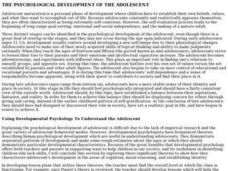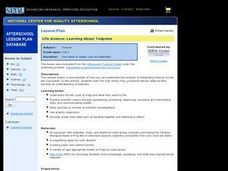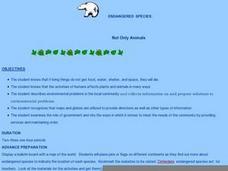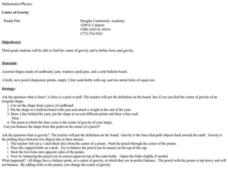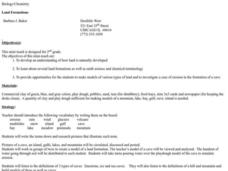Curated OER
Sheep Heart Dissection
Fifth graders examine a sheep heart. In this biology lesson, 5th graders dissect a sheep heart to identify the parts of a heart including the aorta, valve, septum, and ventricle.
Curated OER
The Physiological and Psychological Development of the Adolescent
Students examine the life of a teenager from their own perspective and an adult's. In groups, they focus on the biological changes and how they are different in a girl and a boy. Individually, they write a paper about these changes and...
Curated OER
Know Your Cousins - Monotremas, Marsupials, and Placentals
Students discover various mammals. In this biology lesson plan, students recognize characteristics of mammals and categorize mammal groupings. Students describe how mammals grow inside the mother's body and resemble their parents at birth.
Curated OER
Bioplastics
Learners define bioplastics and identify its uses. In this bioplastics lesson, students compare and contrast styrofoam to starch peanuts after careful examination. Learners understand what biodegradeable means.
Curated OER
What Does it Take to be a Survivor? Part One
Students explore marine animal adaptation. In this introductory ocean life biology lesson, students access prior knowledge by participating in a whole class "thought swap." Students form two lines, respond to a prompt from the teacher...
Curated OER
Water filtration with Plants
Sixth graders explain how soil and plants effect contaminated water in nature. In this filtration lesson, 6th graders work in groups to test biofiltration units. Students determine which biofiltration units work best and how they can...
Curated OER
The Dance of the Butterfly
Students explore butterfly life cycles and movement. In this integrated fine arts and biology life cycle lesson, students listen to the book The Very Hungry Caterpillar by Eric Carle and identify the related life cycle stages. Students...
Curated OER
Life Science- Learning About Tadpoles
Students investigate a frog's life cycle. In this tadpole lesson plan, students observe tadpoles in an aquarium and record results. Students fill in a KWL chart as an assessment.
Curated OER
It's Challenging Being Green!
Students influence the plant life cycle as they take care of plants.In this caring for plants lesson, students understand the parts of the plant and their functions in keeping it alive. Students participate in experiments with plants and...
Curated OER
Cell Parts
Students identify parts of a cell. In this biology lesson plan, students create a simulated cell by using Jell-o, fruit roll ups, raisins, gum drops, and M&M's. Students construct the simulated cell and identify each part.
Curated OER
Endangered Species: Not Only Animals
Young scholars research endangered animals and plants. In this biology lesson, students are read Will We Miss Them? Endangered Species by Alexandra Wright before they begin searching for information to complete an endangered species...
Curated OER
Center of Gravity
Fourth graders conduct experiments to identify the center of gravity. In this gravity instructional activity, 4th graders do two hands-on experiments to increase their understanding of this concept. This self-discovery instructional...
Curated OER
Air Engine - Air Races
Students conduct an experiment about air volume, density, and pressure. In this air instructional activity, students discuss air, and how it moves. They make predictions about what will happen during the balloon and string experiment....
Curated OER
Watch Me Grow
Students observe that plants need air, food, light, and water to survive. In this plant biology instructional activity, students observe the growth and development of two plants, one is the control plant and the other is denied either...
Curated OER
Parts of a Tree
Learners identify four parts of trees. In this plant biology lesson, students read the book Trees and conduct Internet research to identify the parts of the tree. Learners take notes from each website and complete an included worksheet.
Curated OER
Osmosis and Diffusion: Egg Lab
Students examine why diffusion and osmosis happen in an egg cell. In this diffusion lesson plan students demonstrate a semi permeable membrane.
Curated OER
Growing A Coral Skeleton
Students research the growth of coral. In this coral polyps instructional activity, students simulate the growth of coral by using available materials to grow crystals. Students record observations in a scientific journal.
Curated OER
Collect Data Using a Transect Line
Learners learn about transect lines through a study of marine debris. In this marine debris lesson, students calculate the items on a transect line and graph them. Learners complete a category worksheet.
Curated OER
The Great MPA Debate
Students study the 'Marine Protected Areas' process. In this ocean lesson students work in groups, conduct research and present it to the class.
Curated OER
Basic Introduction to Foundation of Life: Genes, Genetics and Genetic Diseases
Students are introduced to genetics along with genetic diseases and heredity. In groups, they complete a Punnett Square to determine the dominant and recessive genes. After viewing diagrams, they identify the characteristics of DNA and...
Curated OER
Land Formations
Second graders explore land formations. In this science lesson plan, 2nd graders develop an understanding of how land is naturally developed, investigate several land formations as well as earth science and chemical terminology, and ...
Common Sense Press
What is the Skeletal System?
Students investigate the human skeletal system. For this biology lesson, students trace the outline of their body onto butcher paper and fill in the names of the bones. Students use an overhead transparency of the human skeletal system...
Curated OER
Enemies and Threats to Sea Horses
Learners research threats and enemies of the sea horse. In this animal biology instructional activity, students use the Internet to find threats and enemies of sea horses and write a paragraph on their findings.
Curated OER
Insects!
Young scholars explore the diet of insects. In this "insects" biology lesson, students take a nature walk and collect various natural materials they think may be eaten by insects. Young scholars sort and classify these materials into...



